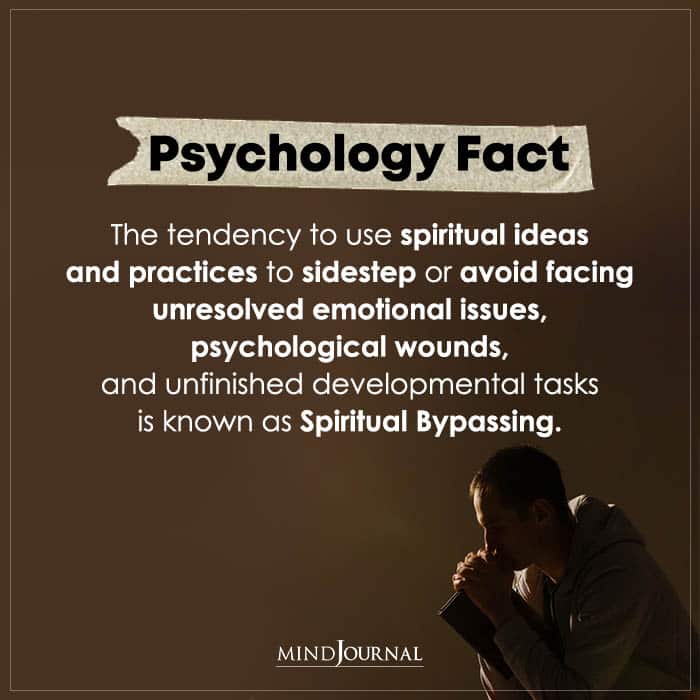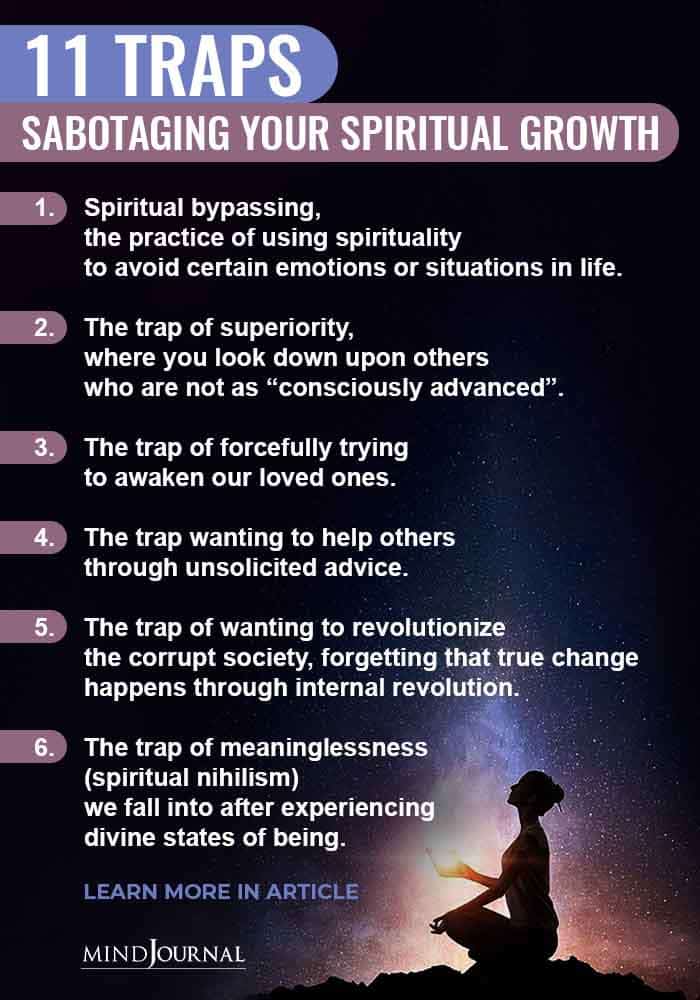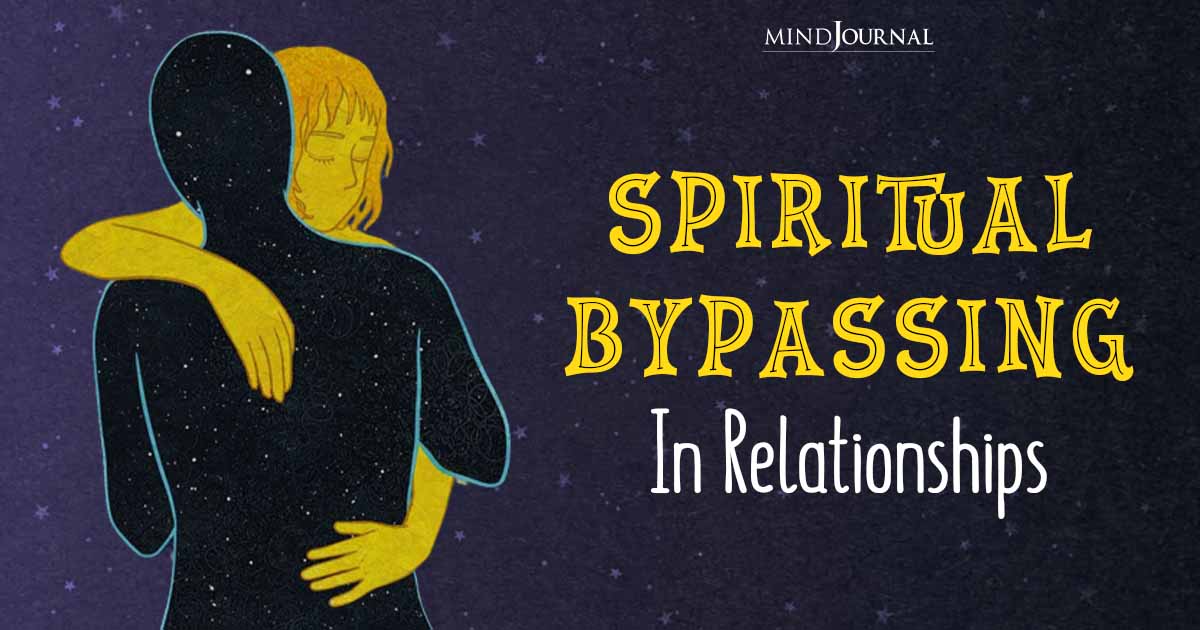Do you know what spiritual bypassing in relationships means? It’s like using a crutch of spirituality instead of making your relationship work.
In recent years, spirituality has gained significant popularity as individuals seek deeper meaning and connection in their lives. It has become an avenue for personal growth, introspection, and understanding.
However, amidst this surge of interest, a concept known as “spiritual bypassing” has emerged, raising important questions about its impact on relationships.
Spiritual bypassing refers to the tendency to use spiritual beliefs and practices as a means to avoid addressing emotional and psychological challenges in relationships.
In this article, we will explore the phenomenon of spiritual bypassing in the context of relationships, and its potential consequences, and offer strategies for developing a more balanced and authentic approach to spiritual growth within romantic partnerships.
Read What Is Spiritual Bypassing? 10 Ways In Which Spirituality Can Become A Way To Avoid Personal Growth
Understanding Spiritual Bypassing Meaning

Spiritual bypassing is often rooted in the desire for transcendence, seeking to rise above the messiness and complexities of human relationships.
It occurs when individuals use spiritual concepts, such as unconditional love, forgiveness, or detachment, as a shield to avoid dealing with unresolved issues or uncomfortable emotions.
While spiritual practices can be transformative, spiritual bypassing can lead to the neglect of genuine emotional and psychological work required for personal growth within relationships.
Spiritual Bypassing Signs
Here are the signs of spiritual bypassing in a relationship:
1. Denial Of Emotions:
Engaging in spiritual bypassing often involves suppressing or denying emotions, believing that they are “negative” or “unspiritual.” However, ignoring emotions can prevent authentic connection and hinder the resolution of underlying issues.
2. Premature Forgiveness:
By prematurely forgiving or overlooking hurtful behaviors, individuals may use spiritual concepts to bypass the necessary healing process. This can hinder personal growth and the establishment of healthy boundaries within relationships.
3. Overemphasis On Positivity:
Spiritual bypassing often promotes a relentless focus on positivity and the avoidance of anything deemed “negative.”
This can create an unrealistic expectation of constant happiness, dismissing the importance of acknowledging and working through challenging emotions.
Read The Hidden Dangers Of Toxic Positivity
4. Intellectualizing Experiences:
Individuals may use intellectualization as a means to detach from the emotional impact of relationship issues. By reducing complex experiences to mere concepts, they may fail to engage in the deeper work required for personal transformation.
Consequences of Spiritual Bypassing in A Relationship
Let’s understand the consequences of spiritual bypassing in the context of relationships.
1. Suppressed Resentment:
Unaddressed emotional wounds can fester over time, leading to unresolved resentment within relationships. By bypassing the necessary emotional work, individuals may inadvertently hinder the growth and intimacy of the partnership.
2. Lack Of Authenticity:
Authenticity is the foundation of healthy relationships. Spiritual bypassing can create a facade of harmony and positivity while suppressing genuine feelings and needs, making it challenging to establish an authentic connection with one’s partner.
3. Repeat Patterns:
By avoiding personal growth and the examination of one’s own behavior, individuals may perpetuate unhealthy relationship dynamics.
Spiritual bypassing can hinder the opportunity for self-reflection and change, leading to repetitive patterns and unresolved conflicts.
4. Emotional Disconnection:
Spiritual bypassing can inadvertently disconnect individuals from their own emotions, as well as from their partner’s emotions. This emotional distance can hinder empathy, understanding, and the cultivation of deep emotional bonds.

Overcoming Spiritual Bypassing In Relationships
Here are the strategies that can help you save your relationship!
1. Self-Awareness:
Developing self-awareness is crucial in recognizing the tendencies of spiritual bypassing within oneself. Honest introspection and self-reflection allow individuals to identify their avoidance patterns and take responsibility for their emotional well-being.
2. Emotional Intelligence:
Cultivating emotional intelligence enables individuals to acknowledge and process their emotions authentically. By embracing the full spectrum of emotions, individuals can foster healthy communication, empathy, and connection within their relationships.
3. Integration Of Spirituality And Psychology:
Recognizing the interplay between spirituality and psychology can be transformative in relationships. Combining spiritual practices with psychological insight and therapy can help individuals address emotional wounds and navigate challenges more effectively.
4. Honoring The Shadow Self:
Embracing the shadow aspects of ourselves—the parts we often try to hide or deny—is essential for authentic growth in relationships.
By acknowledging and integrating these aspects, individuals can develop a more holistic understanding of themselves and their partners, fostering deeper empathy and compassion.
Read How To Identify Your Shadow Self: Discovering Your Hidden Depths In 7 Steps

5. Open And Honest Communication:
Creating a safe space for open and honest communication is vital in addressing relationship challenges.
By encouraging vulnerability and actively listening to one another, individuals can avoid the pitfalls of spiritual bypassing and work together toward genuine growth and resolution.
6. Balancing Spirituality And Personal Growth:
Recognize that spiritual growth is not a substitute for personal growth. Embrace spiritual practices as tools for self-awareness and connection, but also prioritize the necessary emotional and psychological work required for healthy relationships.
7. Seek Support:
Engaging in couples therapy or seeking guidance from spiritual teachers or mentors can provide valuable insights and guidance in navigating the complexities of spiritual growth within relationships.
Professional assistance can offer new perspectives, support healing, and facilitate growth in a balanced manner.
8. Patience And Compassion:
Remember that personal growth is a lifelong journey. It requires patience, self-compassion, and compassion toward your partner. Be gentle with yourself and your partner as you navigate the challenges and complexities that arise along the way.
Don’t Run Away From Difficult Emotions
Spiritual bypassing in relationships can hinder genuine growth, intimacy, and authenticity. While spirituality can be a powerful tool for personal transformation, it is crucial to recognize and address the tendencies of spiritual bypassing.
By doing so, we can foster deeper connections, resolve conflicts, and create a foundation of authenticity and love in our partnerships.
Now that you know spiritual bypassing meaning and spiritual bypassing signs, let us know your views by commenting down below!
Frequently Asked Questions
What is the problem with spiritual bypassing?
Spiritual bypassing can lead to the neglect of genuine emotional and psychological work required for personal growth within relationships.
What is spiritual bypassing grief?
The phrase means using spiritual concepts or rituals to avoid dealing with difficult emotions like grief, loneliness, anger, or sadness.
What is spiritual bypassing?
Spiritual bypassing refers to the tendency to use spiritual beliefs and practices as a means to avoid addressing emotional and psychological challenges in relationships.










Leave a Reply